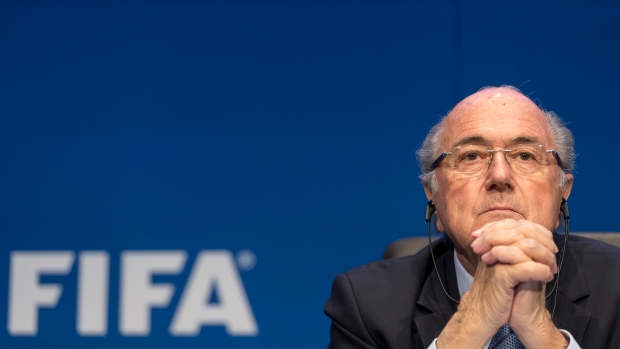Jun 2, 2015
Blatter's reign of scandal: a timeline
After nearly 17 years in office, Sepp Blatter's reign as FIFA president is over. An executive with sport's largest organization for 40 years, TSN.ca looks back at some of the notable moments of Sepp Blatter's career.
TSN.ca Staff

After nearly 17 years in office, Sepp Blatter's reign as FIFA president is over. An executive with sport's largest organization for 40 years, TSN.ca looks back at some of the notable moments of Sepp Blatter's career.
1997: Blatter, FIFA's general secretary, is implicated in a bribery scandal surrounding FIFA president Joao Havelange and his then son-in-law, Ricardo Teixiera. Blatter is later exonerated of any involvement, but a record of a wire transfer of 1.5 million francs to Havelange's bank account exists.
1998: Blatter, 62, is elected with 58 per cent of the vote to succeed Brazilian Havelange as FIFA president after terms as the organization's technical director (1975-1981) and general secretary (1981-1998).
1999: Blatter is named as member of the International Olympic Committee.
2001: Swiss marketing firm, International Sport and Leisure files for bankruptcy. As FIFA's marketing partner, ISL's considerable debt threatened to mire the soccer organization in embarrassment and greatly hamper Blatter's chances of re-election. A 2013 internal investigation finds that FIFA officials received millions in kickbacks from ISL, but Blatter, himself, is not implicated. He does not come out unscathed, though, with the FIFA investigation determining his conduct as "clumsy."
2002: Blatter is elected to a second term as president, this time receiving 71 per cent of the vote, despite Michel Zen-Ruffinen, FIFA general secretary, making a detailed presentation to the FIFA Executive Committee on Blatter's abuse of power.
2004: In discussing potential improvements in the women's game, Blatter states, "They could, for example, have tighter shorts."
2006: Vice-president Jack Warner is accused of marketing fraud in the resale of World Cup tickets in his home country of Trinidad and Tobago. Despite allegations that Warner pocketed over $900K in the ticket scheme, a FIFA investigation spares Warner from censure, but comes down on the vice-president's son.
2007: Blatter receives a third term as president, this time after running unopposed.
2008: After Croatia fans racially abuse England striker Emile Heskey during Euro 2008, Blatter says that he and FIFA "take the fight against racism very seriously" and proceeds to fine the Croatian Football Federation a total of £15K.
2010: Despite wide criticism of the idea, FIFA goes ahead with a plan to award two World Cups, 2018 and 2022, at once. Before voting can take place, The Sunday Times catches two members of FIFA's Executive Committee, Reynald Temarii (Tahiti) and Amos Adamu (Nigeria), asking for bribes on tape. Later, England's bid chief reveals that four members of the Executive Committee approached him with bribe requests, with one asking for knighthood in exchange for support. Russia (2018) and Qatar (2022) are awarded the respective World Cups.
2011: Blatter is given a fourth term - having run again unopposed - but not before both Warner and fellow Executive Committee member Mohammed bin Hammam are suspended when evidence of a bribe during a CONCACAF meeting emerges. Later in the year, Blatter states that the solution to combatting racism in the game is "shaking hands and moving on," only weeks after telling the BBC that racism did not exist on the soccer pitch. Blatter made the comments in response to racism existing on the soccer pitch with incidents involving Chelsea captain John Terry and Liverpool striker Luis Suarez.
2012: FIFA begins an internal investigation of the bidding process that saw Russia and Qatar awarded World Cups. American lawyer Michael J. Garcia is appointed head of the investigation.
2014: Garcia releases a 430-page dossier documenting his findings in September. FIFA subsequently releases a heavily redacted, 42-page version of the investigation that clears both Russia and Qatar of any impropriety. Garcia calls this version "materially incomplete" and filled with "erroneous representations" before resigning from FIFA altogether in December. An ESPN E:60 reveals that construction on the 12 Qatari World Cup stadiums is mostly being done by foreign nationals from impoverished nations in squalid conditions and extreme heat. The special uncovers that 184 Nepalis died in 2013 alone due to cardiac arrest brought on by the heat. The Qatari government does not deny the deaths, but insists that they are unrelated to World Cup projects. In light of ESPN's findings, Blatter claims that workers are enjoying "better conditions" thanks to the World Cup.
2015: On May 27, Swiss officials arrest 14 people, including nine former or current FIFA officials, after indictment in New York on a variety of corruption charges. After the arrests, Blatter claims that "it's too late to resign." Two days later on May 29, Blatter is re-elected to an unprecedented fifth term as FIFA president, receiving 65 per cent of the vote, despite wide calls for a postponement of the election.
June 2, 2015: Sepp Blatter steps down as president of FIFA. Shortly thereafter, ABC News reports that Blatter has been the subject of an FBI investigation.


